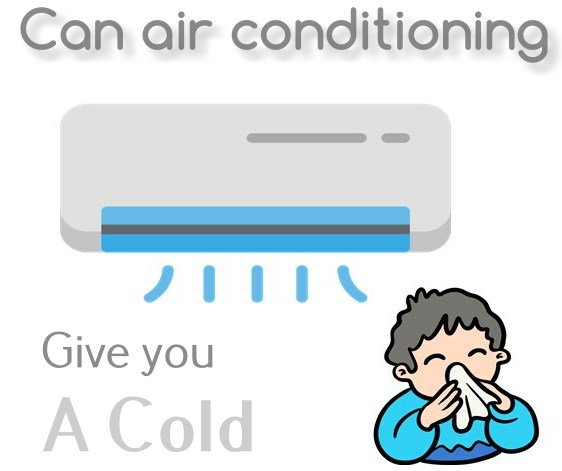Commonly, you will catch a cold by air conditioning unit. Yes, almost all people believe this statement as the air conditioner gives cold temperatures to the room. But the question is, can air conditioning give you a cold?
An air conditioner can make you sick, but it all depends on how you maintain your unit as well as your body. The cold air they blow is not the reason behind your sickness. However, an AC unit makes your indoor room a bit dryer to lower the humidity levels inside your house.
Why is Air Conditioning Can Give You A Cold?
In this case, the hydration inside your body will be on a lower level, too, if you don’t maintain it by drinking water. This dryness will decrease your body’s power to encounter viruses and bacteria in the airspace.
Scientific Insight: Research shows that air conditioning does not directly cause colds. Colds are caused by viruses, not by being in a cool environment. However, air conditioning can contribute to factors that make one more susceptible to colds.
Another explanation is that you will get sick if you’re not faithful to the cleaning routine for your unit. To put it simply, an air conditioner can get dirty and dirtier because it filters the air outside. However, the air may contain pollutants and get piled up after weeks of usage.
Factors Affecting Health in Air-Conditioned Environments
| Factor | Description | Health Impact |
|---|---|---|
| Dry Air | Reduced humidity levels due to air conditioning | Respiratory tract irritation, dry mucous membranes |
| Allergens and Pathogens | Circulation of dust, mold, and bacteria from poorly maintained systems | Increased allergy and asthma symptoms |
| Sudden Temperature Changes | Frequent transitions between hot and cold environments | Weakened immune response, higher infection risk |
| Regular Maintenance | Cleaning and servicing the AC unit regularly | Reduces allergens and pathogen circulation |
| Humidifiers | Adding moisture to the air to maintain optimal humidity levels | Prevents dry air and respiratory irritation |
| Proper Ventilation | Ensuring fresh air circulation through open windows and exhaust fans | Reduces indoor concentration of allergens and pathogens |
Besides that, the condenser coil collects the moisture that is absorbed by the air conditioning unit. That way, mold can grow when the layers of dirt meet the high moisture environment. It becomes harmful if you breathe this type of air.
“It’s not the air conditioning itself that causes colds, but rather the dry air and poor maintenance of the system that can contribute to respiratory issues.”

Air Conditioning Sickness Symptoms
Now you know that we have given you a hint already, can air conditioning give you a cold?
Yes, it could. But how can you spot them? What are the symptoms? Keep on reading as we try to give you the information.
Flu-like
Speaking of sickness symptoms caused by an air conditioner, you may find yourself catching a flu-like symptom. Hence, if your body is exposed to the AC unit for a long time, you will get fatigue and headaches.
Read also: How to Clean Mold from Air Conditioner
Coughing and Sneezing
It may seem paltry, but coughing and sneezing could come from the air conditioning unit you own in your house. This symptom is caused by the bacteria that is gathered around the dust.
Even worse, if the dust is thick already, it creates the perfect environment for molds to grow. Therefore, you will find yourself coughing and sneezing wherever you’re indoors with the air conditioning unit on.
However, you have to pay attention and suspect something when you start to feel the constant coughing and sneezing. Significantly when these symptoms last even longer, chances are the unit needs to be cleaned and technician checkups as there could be molds growing inside.
Dry Skin and Eyes
Next up, the dry air inside your room could make your skin dry and flaky, as well as dry and irritated eyes. That said, when your room uses an AC unit, you have to maintain the hydration inside your body. If you don’t give enough water to your body, you will feel a little dizzy.
Blood Pressure Increases
Last but not least, the low humidity levels inside your house affect your blood pressure. When your body loses its heat, the small arteries will defend you from getting cold by increasing blood pressure.
If this happens for a long time, you will become a person with low tolerance when you’re outdoors. You will feel uncomfortable wherever you’re not in a room that doesn’t have an air conditioning unit.
To prevent being this person, even though you spend most time indoors, we suggest you walk outside for better circulation inside your body. You can also try another alternative by turning the temperatures up every few hours. We also recommend not to use the air conditioner when the heat is still tolerant.
Tips to Maintain a Healthy Indoor Environment
- Regular Maintenance
- Expertise Advice: Ensure that your air conditioning unit is regularly serviced. This includes cleaning or replacing filters and checking for mold or bacterial growth. Regular maintenance can prevent the circulation of harmful pathogens.
- Regularly cleaning and servicing your air conditioning system can significantly reduce the risk of circulating allergens and pathogens.
- Humidifiers
- Research and Case Studies: Using a humidifier can help maintain optimal humidity levels, preventing the air from becoming too dry. This can reduce respiratory irritation and improve overall comfort.
- Proper Ventilation
- Expertise Advice: Ensure that your space is well-ventilated. Opening windows periodically and using exhaust fans can help circulate fresh air, reducing the concentration of any potential allergens or pathogens indoors.
- Good ventilation is key to maintaining a healthy indoor environment, especially when using air conditioning frequently.
Well, the air conditioning unit is not bad for your health. However, you need to pay attention to maintenance and cleanliness to prevent any harmful particles. So, as long as you keep the unit and your room clean, you won’t find yourself catching a cold from the daily use of an air conditioner inside your house.


